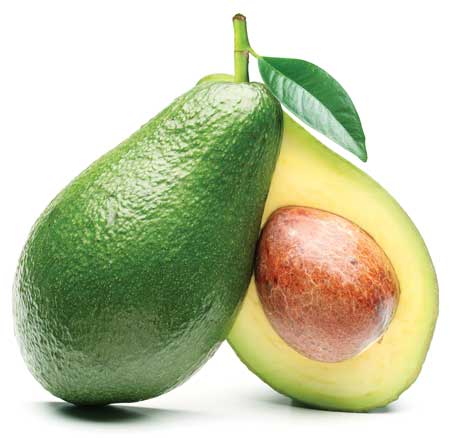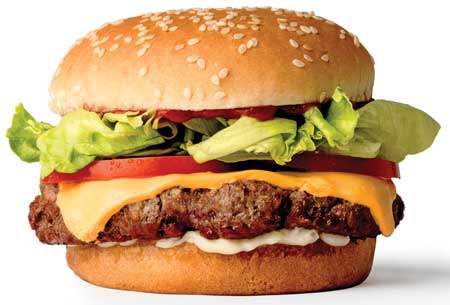A vote against carrageenan; The power of unlikely alliances
NEWS
 Avocado extract effective vs. Listeria
Avocado extract effective vs. Listeria
Extracts and isolated compounds taken from avocado seeds can potentially be used as a natural additive in ready-to-eat foods to control microbes that cause Listeria monocytogenes, according to a recent study published in the Journal of Food Science.
Researchers from Tecnologico de Monterrey in Mexico compared enriched acetogenin extract (EAE) from avocado seeds with Avosafe and Mirenat, name-brand synthetic antimicrobials. They found that the EAE offered similar Listeria-fighting properties and chemical profiles to the synthetic antimicrobials. The EAE was effective at 37°C and at refrigeration temperatures (4°C).
The researchers concluded that “avocado acetogenins possess anti-listerial activity comparable to that of synthetic commercial antimicrobials, indicating that enriched extracts or isolated compounds from avocado fruit can potentially be incorporated into ready-to-eat foods as natural additives to control Listeria monocytogenes.” As avocado seeds are a waste product of the food industry, extracting EAE and using it in food products may offer a value-added, sustainable opportunity for manufacturers.
Click here to read the abstract.
NOSB votes against carrageenan
The National Organic Standards Board (NOSB) voted to remove carrageenan, a hydrocolloid derived from red seaweed, from its list of substances allowed in foods labeled organic in the United States.
During a 2012 sunset review, concerns were raised about whether the manufacturing process to create carrageenan from seaweed might turn it into a synthetic material by the NOSB definition. In addition, public comments at the time indicated considerable controversy surrounding the ingredient’s effect on human health. A subsequent investigation by the committee, however, found that the body of scientific evidence does not support claims of widespread negative human health impacts from consumption of carrageenan in processed foods.
“We recognize that consumer demand to remove carrageenan has already led to the removal of carrageenan from a number of categories of products and that other alternatives could be used to replace carrageenan in additional products,” the NOSB wrote in its review. “Subcommittee members think that there are alternatives to using carrageenan and recommend removing this material from the National List.”
There are some uses, however, that do not have easy alternatives, such as in vegan and vegetarian foods, where animal-based gelatin is not allowed. Some industry groups have expressed their displeasure with the decision, which is expected to be written into law in the coming year.
“Carrageenan should remain on the National Organic Standards Board list of approved food additives because it has been proven safe for consumption and there is not an adequate alternative replacement that provides the same functions,” said the Grocery Manufacturers Assoc. in a statement.
The power of unlikely alliances
Creating changes in the food system of the future may lie in forming unlikely partnerships and opening dialogue between groups with seemingly different interests, according to a panel session held during the 2016 Chicago Food Tank Summit.
It is important to find out more about what different parties have in common rather than what they disagree on, said David MacLennan, chairman and CEO of Cargill. He described a situation he experienced a decade ago when his company worked alongside Greenpeace and the Brazilian government to stop deforestation in the soybean production process in Brazil. In addition to introducing immediate change, this moratorium on deforestation has continued to this day.
To enable partners with all levels of influence and power to sit down at the table and feel equally represented, Sarah Vared, interim director of reFED, recommends letting data and facts rather than opinions and emotions shape the conversation. Her food waste reduction organization has created a data-driven food waste reduction road map that considers all stakeholders in the supply chain.
--- PAGE BREAK ---
 A dinner of the future
A dinner of the future
Highlighting “potentially disruptive foods with implications across the supply chain,” food writer and FutureFood 2050 contributor Josh Schonwald walked audience members through the technologies and innovations that may impact what food in the year 2040 might look like during a session held at the Chicago Section Suppliers’ Night this fall.
Schonwald pointed to CRISPR-Cas9 gene editing as a useful tool for creating new crops through gene editing rather than engineering; these foods are altered by means of gene “scissors” to cut out the activation of a trait. They are not regulated the way GM crops are, meaning they do not have to be labeled (yet) as genetically modified, and anyone can use the technology—it isn’t limited to big corporations and can even be done by individuals at home.
Meat production can be costly and resource intensive, and Schonwald says meals of the future may rely instead on “cowless cows.” Cultured meat products are already available, and by 2040, he says this option may even cost less than traditional beef. On the animal feed side, companies like Calysta are using fermentation to create a protein alternative to fishmeal.
Speaking of the sea, Schonwald says marine agronomy has great potential. Currently, less than 2% of food production comes from the oceans, and seaweed is an untapped food source that is fast-growing, high in protein and minerals, and can help fight ocean acidification. Microalgae, which is already appearing in the market, can also be grown on land in otherwise inhospitable environments.
Since some of the companies working on these advances, such as Impossible Foods, do not come from food production backgrounds, Schonwald says it may take someone outside the industry to disrupt it.
Top 10 trends for 2017
The top trends expected to emerge in 2017 are in many ways a continuation of those that have been important over the last few years, including clean label, plant proteins, and ethnic flavors, said Lu Ann Williams, director of innovation for Innova Market Insights, during a recent webinar.
“Interest in naturalness and clean label continues to feature strongly,” according to Williams, who notes that some iteration of “clean and clear” has appeared on her annual trends list since 2008. Now the desire for transparency extends to all aspects of the supply chain, and accordingly, environmentally friendly claims have shown a 72% compound annual growth rate from 2011 to 2015. Plant-based claims have moved into the mainstream as well, she says, with fruits and vegetables being used in colorings and herbs and spices being considered as healthy ingredients. In addition, “energy from natural sources is booming,” such as green tea and green coffee beans.
In recent years, consumers have become more knowledgeable about particular flavors from around the world, and according to Williams, 2017 will see a proliferation of this desire for authentic ethnic cuisine. There has “never been a time like this” for global flavors, she observed, with the audience for such flavors getting younger and younger. There is an opportunity here for companies to develop “high authentic” foods with specific ingredients, such as restaurant-quality versions of comfort food classics and food truck–inspired snacks.
Other trends include sugar reduction, personalized nutrition, seeds and grains, products targeted to a certain daypart, and craft versions of pantry staples like mayonnaise and cola.
News Bites
• Allen Harim launched Oasis, a Halal chicken available in grocery stores throughout the Mid-Atlantic and Northeast.
• Barry Callebaut launched a comprehensive sustainability plan that it is calling “Forever Chocolate.” Its key components involve sustainable ingredients, eradicating child labor, empowering farmers, and preserving the ecosystem.
• Cargill is expanding its poultry-processing operations in Thailand, and it recently opened an innovation center in China.
• Thailand’s Charoen Pokphand Foods entered into a definitive agreement to acquire U.S. frozen-food producer Bellisio Parent for nearly $1.1 billion.
• Clasen Quality Coatings changed its name to Clasen Quality Chocolate.
• Dean Foods and CROPP, an independent farmer cooperative, partnered in a strategic joint venture to bring Organic Valley milk to retailers through Dean Foods’ processing plants and refrigerated direct store delivery distribution system.
• Dr Pepper Snapple Group will acquire Bai Brands.
• Ingredion entered into an agreement with SweeGen to be the exclusive global distributor of the company’s stevia sweeteners in all markets except China.
• The U.S. Agency for International Development awarded Kansas State University nearly $1.1 million to establish a genomics-assisted sorghum breeding program in Haiti.
• McCormick & Co. will purchase Italian flavor business Enrico Giotti for $127 million.
• Graham Partners, a private investment firm, has announced its investment in Mercer Foods, a manufacturer of freeze-dried food products.
• Mérieux Nutrisciences opened its GMO Testing Center of Excellence at its flagship laboratory in Crete, Ill.
• The state of Michigan announced its second soybean processing plant and storage facility.
• Novozymes is expanding its operations in India with plans for a new enzyme production and supply chain facility expected to open in 2018.
• Canadian poultry and pork producer Olymel acquired Alberta-based Pinnacle Farms to expand its hog production operations in the western part of the country.
• Pilgrim’s Pride Corp. will acquire GNP Co., which operates brands including Gold’n Plump and Just Bare.
• Purdue University College of Agriculture developed a new website (The Science of GMOs) with information that addresses the complex economic, environmental, health, and public policy issues related to genetically modified organisms.
• Q Laboratories acquired the Bruker MALDI Biotyper, a technology that allows for rapid, cost-effective, accurate identification of thousands of microorganisms.
• Salt of the Earth has made significant investments to triple production of its Mediterranean Umami brand.
• Snyder’s-Lance made a deal with Blue Road Capital to sell its Diamond of California culinary nut business.
• The U.S. Dept. of Agriculture and the Environmental Protection Agency announced 2030 Champions, a coalition of 15 major U.S. companies—including Kellogg Co., Campbell Soup Co., and General Mills— that have committed to reducing food loss and waste by half by 2030.
• The U.S. Food and Drug Administration is amending a food additive regulation to no longer authorize the use of two long-chain perfluorinated compounds used in “grease-proof” food packaging based on the abandonment of these uses.
 Melanie Zanoza Bartelme, Associate Editor
Melanie Zanoza Bartelme, Associate Editor
[email protected]
